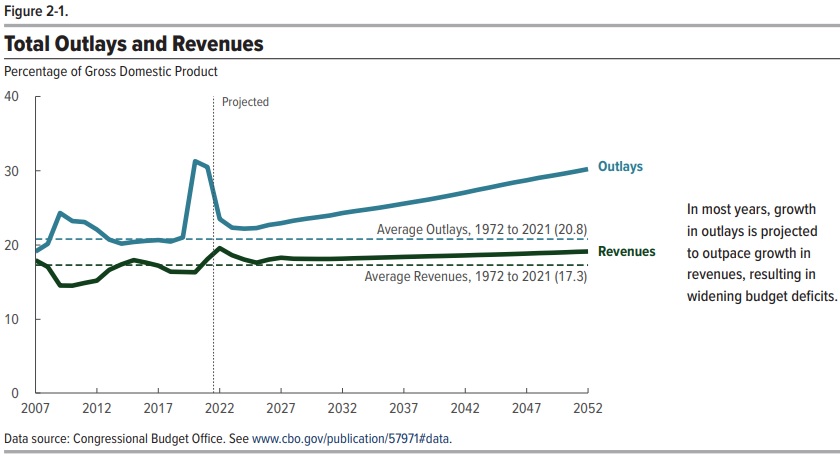November 11, 2022 by Dan Mitchell @ International Liberty
In yesterday’s column, I explained Republicans are not credible advocates of lower tax rates if they don’t also push for spending restraint.
And, as I explained to the Adam Smith Institute, they will be de facto advocates of higher taxes if they embrace the wrong version of national conservatism.
To understand why I’m concerned, look at the most-recent edition of the Congressional Budget Office’s long-run fiscal forecast.
It shows that the burden of government spending is going to substantially increase over the next three decades – largely due to the unchecked growth of entitlement programs such as Medicare and Medicaid.
Failure to control spending will mean two bad things – either huge tax increases or staggering levels of debt. Probably both.
And if politicians add more spending (as Biden has already done), then those long-run trend lines will get even worse.
My concern is that some national conservatives are unwilling to confront this problem and/or they support policies to make matters worse.
But first, in the interest of fairness, bigger government is not an inherent part of the national conservatism platform. At least based on the statement of principles published by The American Conservative.
That document, signed by the key advocates of national conservatism, lists 10 concepts, most of which are good from a libertarian perspective and only one of which is overtly troubling.
- National independence (I cheer for anyone opposed to global governance)
- Rejection of imperialism and globalism (they’re opposed to the bad form of globalism)
- National government (very akin to “state capacity libertarianism“)
- God and public religion (not a role for government, but they’re not pushing bad ideas)
- The rule of law (good idea)
- Free enterprise (they have a few unnecessary caveats)
- Public research (I’m skeptical of this one)
- Family and children (not a role for government, but they’re not pushing bad ideas)
- Immigration (I’m more sympathetic than they are, but agree on the importance of assimilation)
- Race (they want neutrality rather than preferences)
Unfortunately, some national conservatives go beyond this statement of principles and push for bigger government.
- Such as industrial policy.
- Such as per-child handouts.
But don’t believe me. Bill McGurn of the Wall Street Journal makes similar points.
Mr. Cass’s movement insists (rightly) that purely economic and material measures are limited. But whenever they move beyond rhetoric to specifics, their preferred solutions almost always turn out to be economic interventions, from child tax credits to industrial policy. …Even a cursory glance at the record of the past half-century shows government often doing the most harm to people precisely when it is trying to help them. Federal efforts to promote homeownership ended up encouraging banks to lend people more than they could afford and feeding a housing bubble. Federal college loans helped drive up tuition while leaving Americans $1.6 trillion in debt. As we ought to have learned from the Great Society, well-intentioned government policies can do immense damage to families and communities. Unfortunately, when it comes to getting the toothpaste back in the tube, government has shown much less success.
The bottom line is that national conservatives always seem to advocate bigger government when they develop or endorse specific policies.
And, to the best of my knowledge, none of them have put forth any agenda to deal with the spending problem that already exists.
That’s an agenda that guarantees future tax increases. And, for what it’s worth, one of the advocates already has embraced a tax-the-rich agenda to help finance the national conservative agenda.
If Republicans go down that path, it won’t end well (just as it didn’t end well when they embraced other fads such as compassionate conservatism, kinder-and-gentler conservatism, common-good capitalism, reform conservatism, etc).
As I’ve previously noted, there no alternative to Reaganism.


No comments:
Post a Comment